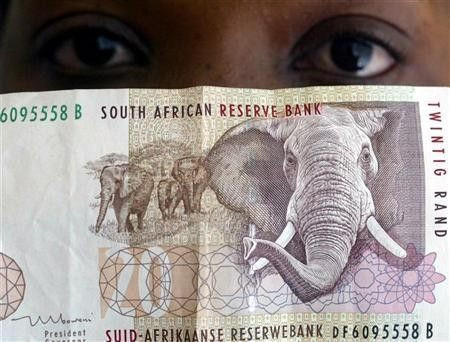Strikes weigh on S.Africa's shares; bonds, rand weaken

South Africa's rand slipped on Thursday after posting strong gains this week, while bond prices fell on concerns over the U.S. debt standoff and stocks fell for the fourth straight day.
Mining stocks fell as unions went on strike, helping drag down the resource-heavy Top-40 index of blue chips by 0.52 percent to 28,099.81. The All-Share index fell 0.47 percent to 31,446.39.
Investors were loathe to hang on to long high-risk assets before U.S. lawmakers vote on a deficit-reduction plan aimed at averting the threat of a default, which has unsettled markets.
Local data showing unemployment rose in the third quarter added to the negative sentiment, highlighting a challenge that could stoke social instability in future.
The rand was trading at 6.7030 to the dollar at 1525 GMT, 0.3 percent weaker than Wednesday's New York close of 6.6820. It hit a fresh two-moth high of 6.6250 earlier.
"We have that U.S. vote tonight so the market is a little gun-shy," said Warrick Butler, dealer at Standard Bank.
"We've seen a lot of local demand for dollars as well as real money selling off bonds, so we had another move up to 6.7150. The market is nervous so there's a lot of off-loading because we've had a good run for some time."
Offshore investment into local bonds has helped to support the rand and it is one of the top three performers so far this year amongst emerging market currencies tracked by Reuters.
Bonds weakened slightly on Thursday, with the yield on the 2015 bond up a basis point to 7.37 and that on the 2026 paper ticking up by the same margin to 8.515 percent.
The break of 7.36 percent on the 2015 bond opens up for 7.20 percent in the weeks to come, said market researchers Tradition Analytics in a note.
"Momentum on the monthly R157 yield chart remains bullish and a test of 7.05 is possible in H2 2011, particularly as the domestic economy continues to under perform peers and price inflation doesn't gain meaningful traction."
Monetary policy is expected to remain accommodative for the rest of this year and interest rates are seen starting to rise from 30-year lows early next year.
On the bourse, falling gold prices hammered listed producers such as AngloGold Ashanti.
"The gold price pulled back quite a bit, the rand is stronger, strikes are having negative factor," said Mitchell Gannaway, a trader at Thebe Securities.
"Mining companies haven't been benefiting as they should from the record gold price."
Global bullion prices have fallen to just above $1,600 an ounce, after hitting a record $1,628 on Wednesday.
Some 100,000 workers at AngloGold, Gold Fields, Harmony Gold and another smaller mining group plan to walk off the job. The work stoppage could cost the sector some $25 million a day in lost output.
AngloGold and Harmony Gold slid 3 percent each to 281.11 and 91.19 rand respectively.
Gannaway said the prolonged debt stalemate in the United States was also weighing on sentiment.
"The longer it goes on before the deadline, (the more) markets will be nervous," he said.
© Copyright Thomson Reuters {{Year}}. All rights reserved.





















